CCME 2 Scholar/Research
Aliya Brown

FACULTY ADVISOR:
Owen F Temby
CCME II THEMATIC AREA:
Costal Resilience
NOAA MENTOR:
TBA
TITLE:
Exploring Intersectionality in Environmental Justice: A Comparative Analysis of Climate Change Perceptions in South Texas and Massachusetts Fishing Communities.
KEY POINTS:
My research interests are deeply rooted in pursuing environmental equity and justice, particularly concerning coastal resilience and community engagement. My anticipated work aims to develop inclusive, resilient coastal communities, particularly addressing historical disparities disproportionately impacting marginalized populations. By ensuring meaningful collaboration with underserved communities, my research seeks to integrate their voices, needs, and cultural perspectives into area-specific resilience strategies, thereby cultivating an inclusive environment where these communities actively contribute to decision-making processes and co-create solutions to extreme weather events and climate change impacts. With this, my field of inquiry aligns with advancing knowledge in the CCME-II thematic area of Coastal Resilience, as it directly corresponds to my desired focus on environmental equity and justice in underserved communities. By engaging with these communities and developing equitable models, my research aims to assess and address their needs in facing coastal hazards and risks. All in all, my goal prioritizes environmental equity and justice as essential for engaging underserved communities in coastal resilience. By aligning my goals with the NOAA CCME-II thematic areas, I am committed to advancing equitable coastal resilience practices that empower communities and drive positive change through social scientific research.
Mya Brown
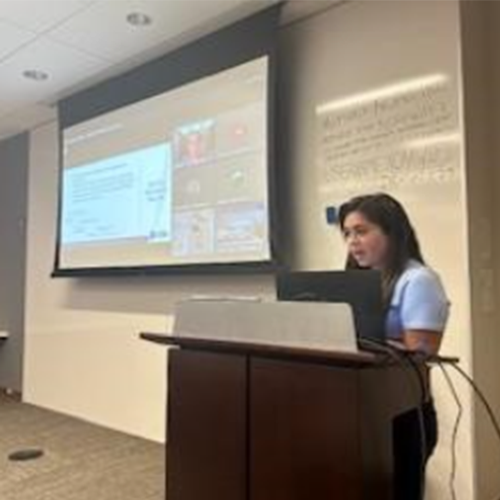
FACULTY ADVISOR:
Owen F Temby
CCME II THEMATIC AREA:
Place-based Conservation
NOAA MENTOR:
Dr. Brent Stoffle, NOAA NMFS
TITLE:
Habitat Restoration on the U.S.-Mexican Border: Examining Collaborative Governance for the Bahia Grande.
KEY POINTS:
This research investigates the effects of management strategies on the antecedents and barriers to collaboration for ecosystem restoration. It operationalizes a typology of management strategies and other concepts and uses them in semi-structured interviews with key stakeholders in the restoration of the Bahia Grande and surrounding floodplain.
It seeks to understand what is done, how the network of stakeholders involved interacts, what barriers to a collaborative and co-productive process remain, and how the actions taken by network leaders affect the process.
This study not only informs Bahia Grande's recovery efforts but also contributes to the broader scholarly literature on stakeholder collaboration in preserving and revitalizing ecosystems facing similar challenges.
Sonia Duran
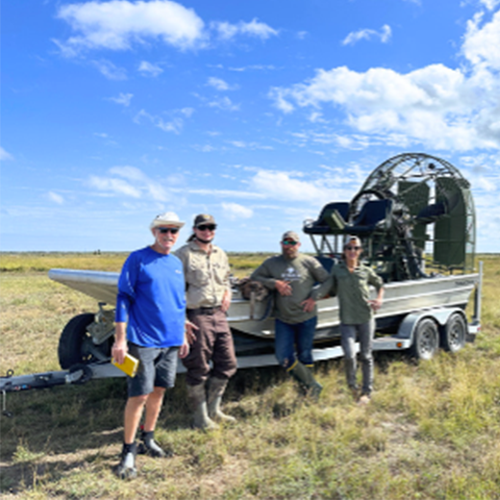
FACULTY ADVISOR:
Dr. David Hicks
CCME II THEMATIC AREA:
Place-based Conservation
NOAA MENTOR:
TBA
TITLE:
A post-channel-widening assessment of the coastal Bahia Grande wetland in Cameron County, Texas.
KEY POINTS:
To assess the benthic macro-invertebrate community assemblages, habitat and vegetation characteristics, and water quality parameters from approximately one year after the pilot channel widening.
David de la Garza
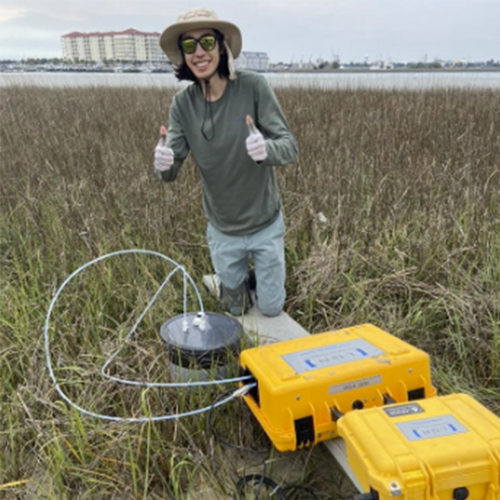
FACULTY ADVISOR:
Alejandro Fierro Cabo
CCME II THEMATIC AREA:
Coastal Intelligence
NOAA MENTOR:
Dr. Jennifer Davis, NOAA NCCOS
TITLE:
Ecological Factors Affecting Soil Carbon Fluxes Across Estuarine Vegetation Zones in Black Mangrove (Avicennia germinans) Stands of the Lower Laguna Madre.
KEY POINTS:
Investigate how greenhouse gas emissions are influenced by a variety of ecological factors like porewater salinity, inundation, soil texture, type of vegetation, and biological activity.
Present an opportunity to understand how a hypersaline mangrove ecosystem will change with climate change and provides some metrics to guide conservation.
Elyssia Gonzalez

FACULTY ADVISOR:
Dr. Erin E Easton
CCME II THEMATIC AREA:
Place-based Conservation
NOAA MENTOR:
Dr. Allen Collins
TITLE:
Application of genomic skimming and target-capture methodologies to investigate species limitation within a genus of Octocorals.
KEY POINTS:
My area of research encompasses coral reef genetics, benthic ecology, and deep-sea and mesophotic communities, specifically Octocorallia and Hexacorallia. I aspire to explore and advance phylogenomics to improve our understanding of the evolutionary history and complex relationships of deep-sea corals. My ambition of my anticipated work is to explore and provide ministration to marine life found in the depths of the ocean. Given my research efforts, I am committed to further knowledge of mesophotic and deep-sea coral research to protect and preserve the biodiversity of newly explored species.
Geaceli Orive
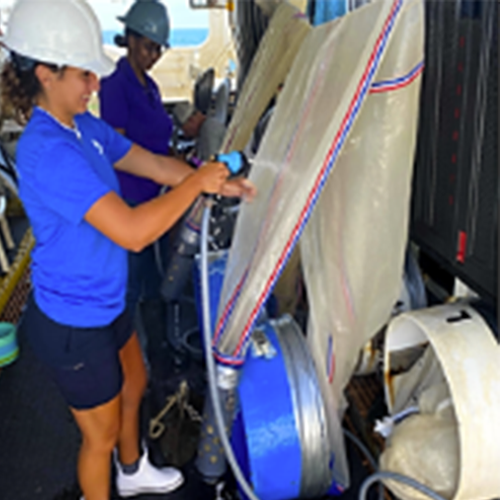
FACULTY ADVISOR:
Dr. Carlos Cintra
CCME II THEMATIC AREA:
Place-based Conservation
NOAA MENTOR:
Dr. Eric Hoffmayer, NOAA NMFS
TITLE:
Insights to Genetic Connectivity of Gray Triggerfish (Balistes capriscus) in the Mexican Caribbean, the Southern and Northwestern Gulf of Mexico.
KEY POINTS:
Yield insights to the improvement of B. capriscus management that will primarily benefit local fisheries, as well as future implications for reef-dependent fishes across the globe.
CCME 1 Alumni/Research
Brianna Alanis
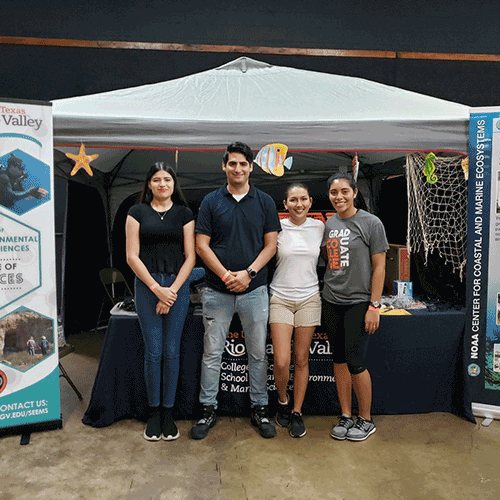
FACULTY ADVISOR:
Dr. John Breier
CCME II THEMATIC AREA:
N/A
NOAA MENTOR:
Dr. Christopher R. Kelble
TITLE:
Enabling High Quality Oxygen Measurements During Robotic Based Studies of Ocean Ecological and Biogeochemical Processes.
KEY POINTS:
Three different oxygen sensors were tested in a trade study for stability, accuracy, precision, drift and detection limits. There is an opportunity for matching the best possible oxygen sensing techniques and methods to these new platforms.
Elena Flores
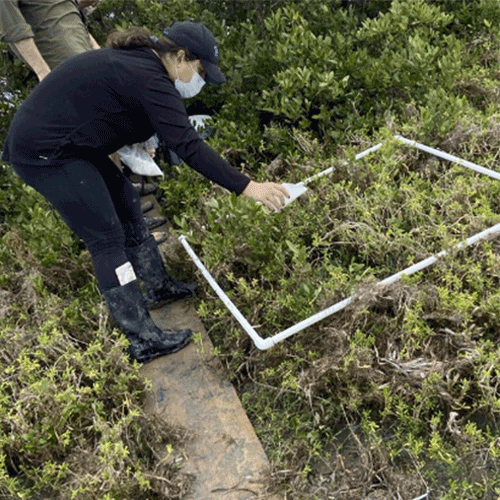
FACULTY ADVISOR:
Alejandro Fierro-Cabo
CCME II THEMATIC AREA:
N/A
NOAA MENTOR:
N/A
TITLE:
Effects of nutrient enrichment on mangrove and saltmarsh Habitats.
KEY POINTS:
Nutrient enrichment in estuaries affect mangrove stands which are a critical component of resilience of coastal shorelines. Research on mangrove and soil responses to nutrient enrichment. Effects of nutrient enrichment on plant architecture, growth.
Elizabeth Mogus Garcia
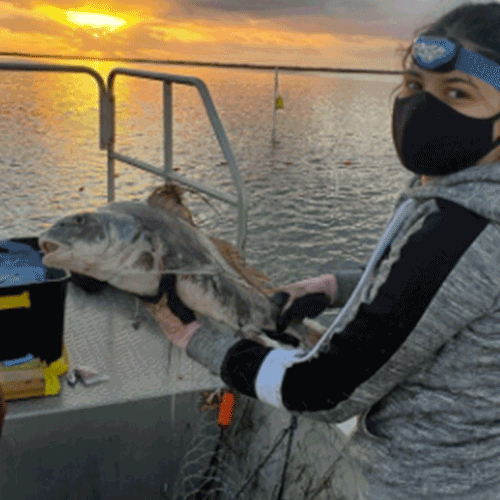
FACULTY ADVISOR:
Dr. Carlos Cintra Buenrostro
CCME II THEMATIC AREA:
Place-Based Conservation
NOAA MENTOR:
Dr. Jennifer Leo
TITLE:
Red drum (Sciaenops ocellatus) trophic web reconstruction using stable isotopes in two systems in the northwestern Gulf of Mexico.
KEY POINTS:
Gut content and stable isotope analysis were done to better understand juvenile Red Drum diet and role within the trophic web.
Rebekah Hernandez
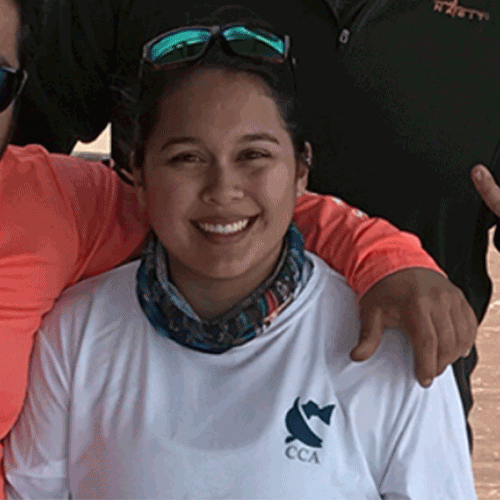
FACULTY ADVISOR:
David Hicks
CCME II THEMATIC AREA:
N/A
NOAA MENTOR:
N/A
TITLE:
Assessing Long-Term Coral Cover at the Flower Garden Banks National Marine Sanctuary.
KEY POINTS:
Reassess the coral coverage using standardized methods to improve estimates of coral cover. Create a coral photostation key using the high-quality images collected in 2015 to allow for consistency and precision when identifying corals in other years. Determine variation in coral coverage and species assemblages from 1989 to 2017 at the East and West FGBs to inform management decisions. Observe in situ during the August 2018 field season a potential ‘unknown’ Orbicella franksi/faveolata/annularis (Merulinidae) species that has been observed at the FGBNMS but not confirmed.
Sandra Leal
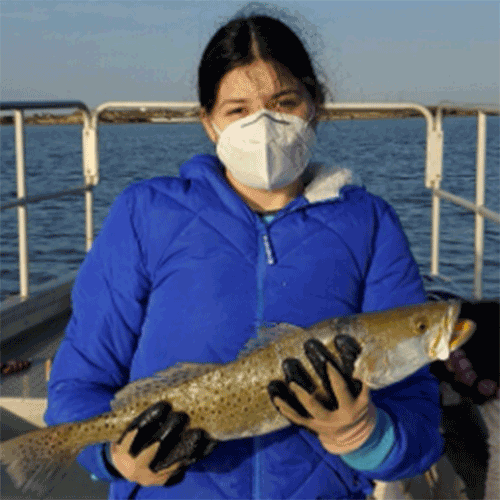
FACULTY ADVISOR:
Carlos E. Cintra-Buenrostro
CCME II THEMATIC AREA:
N/A
NOAA MENTOR:
N/A
TITLE:
Population structure of Red Drum (Sciaenops ocellatus) in two systems in the northwestern Gulf of Mexico
KEY POINTS:
Characterization of Red Drum (Sciaenops ocellatus) population structure in (bay vs. lagoon) water systems in south Texas Baseline to start fulfilling the area’s knowledge gap and offer insights into their habitat utilization Beneficial in the innovation of management techniques/practices for this highly sought after species by local people for food source
David Lecusay
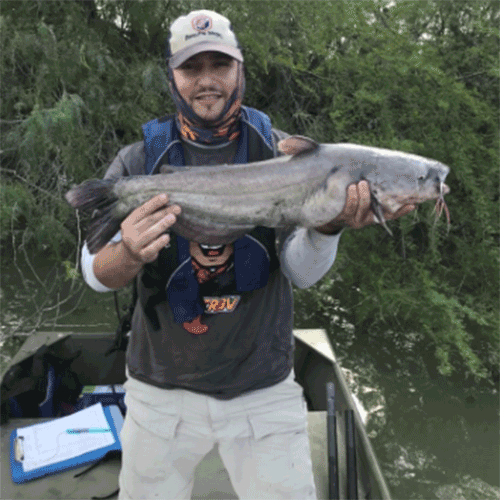
FACULTY ADVISOR:
Alejandro Fierro-Cabo
CCME II THEMATIC AREA:
N/A
NOAA MENTOR:
N/A
TITLE:
Assessment and monitoring of deltaic freshwater wetlands: meliorating and validating a multimetric index of ecosystem health
KEY POINTS:
Resacas, are 250 mile-long abandoned distributary channels of the Rio Grande River Delta. Assessment and validation of a monitoring tool (Resaca Health Index) for detection of degradation and recovery (PBC CC 1-5). Adaptive management and long-term benefits for both humans and regional ecological components
Anthony Lima
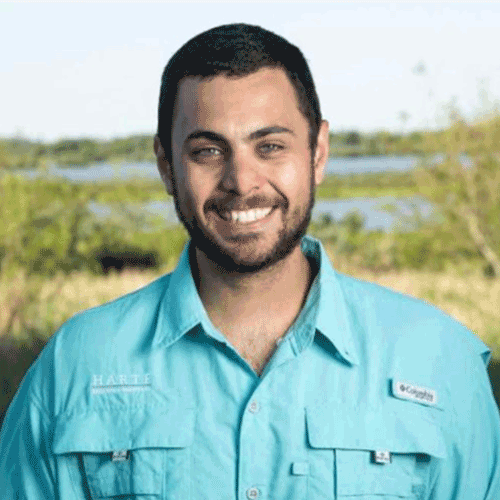
FACULTY ADVISOR:
Dr. Erin Easton
CCME II THEMATIC AREA:
N/A
NOAA MENTOR:
Dr. Scott Large
TITLE:
Measuring connective capacity throughout the Gulf of Mexico Fishery Managment Network
KEY POINTS:
Continued success of the fishery relies on a large, complex, multiagency network to find the best solutions to balance human needs and ensure long-term sustainability. To better understand the connectivity within the Gulf fishery management network, an IRB reviewed survey was dispersed to the largest, most influential organizations.
Christina Madrid

FACULTY ADVISOR:
Dr. Owen Temby
CCME II THEMATIC AREA:
N/A
NOAA MENTOR:
Dr. Kim Penn
TITLE:
Local Disaster Planning and Preparedness Coordination in the Rio Grande Valley.
KEY POINTS:
Disaster preparedness and recovery is a multidisciplinary and multi-jurisdictional effort that requires coordination and planning across many factors. Existing research recognizes the link between social capital and a community’s ability to respond to and ‘bounce back’ to normalcy after such hazardous events. However, few studies have examined the institutional dimension of social capital among communities noted for high levels of poverty situated in disaster-prone areas along the U.S. Mexico border.
Ashley Elizabeth Murphy
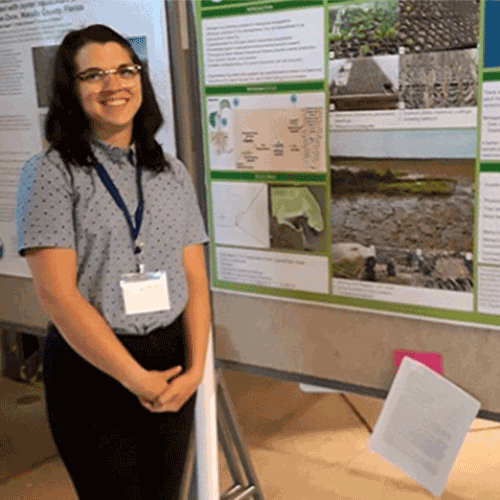
FACULTY ADVISOR:
Dr. Carlos Cintra
CCME II THEMATIC AREA:
N/A
NOAA MENTOR:
Dr. Joseph Serafy
TITLE:
Identifying the N sources for Black Mangrove (Avicennia germinans) in a South Texas Mangrove Forest.
KEY POINTS:
One step to preserve their ecological functions is to identify and protect the source of their nitrogen (N). Nitrogen stable isotopes were sampled for one year and used as tracers to identify how mangroves obtain nitrogen (N).
Javier Navarro

FACULTY ADVISOR:
Dr. Alejandro Fierro Cabo
CCME II THEMATIC AREA:
N/A
NOAA MENTOR:
Dr. Jennifer C. Doerr
TITLE:
Analysis of the facilitative interaction between the herbaceous halophyte Batis maritima and establishing seedlings of Avicennia germinans
KEY POINTS:
Determining if facilitation theory could explain the behavior observed between the herbaceous halophyte Batis maritima and A. germinans.
Evelyn Roozee
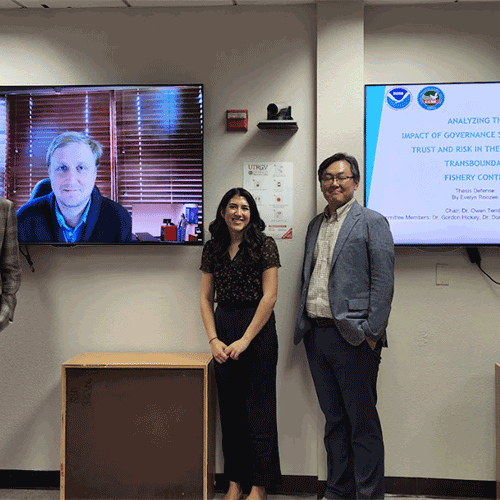
FACULTY ADVISOR:
Owen Temby
CCME II THEMATIC AREA:
N/A
NOAA MENTOR:
Dr. Joseph Serafy
TITLE:
Analyzing the Impact of Governance Strategies on Trust and Risk in the Salish Sea Transboundary Fishery Context.
KEY POINTS:
Understanding management strategies that increase trust and decrease risk to create effective and collaborative transboundary fishery governance in the Salish Sea. Creation of a quantitative survey to operationalize trust, risk, and control mechanisms. Survey analysis to understand the current trust and risk perceptions of the governance network and the relationship between these variables. Network analysis of the collaborative ties between key stakeholder categories.
Victoria Salinas

FACULTY ADVISOR:
David Hicks
CCME II THEMATIC AREA:
N/A
NOAA MENTOR:
N/A
TITLE:
Growth and reproduction studies of black corals (antipatharians): South Texas.
KEY POINTS:
Black corals provide habitat (spawning grounds and shelter) for numerous marine species on low-light (mesophotic) reefs (depths>30 m). Estimate pop. Size and recruitment patterns. Determine growth rates. Determine reproductive timing of two species of black corals at the Texas Clipper artificial reef site. Provide critical data for management decision to maintain productivity and commercial value of the South Texas mesophotic reef habitats.
Juliet Vallejo
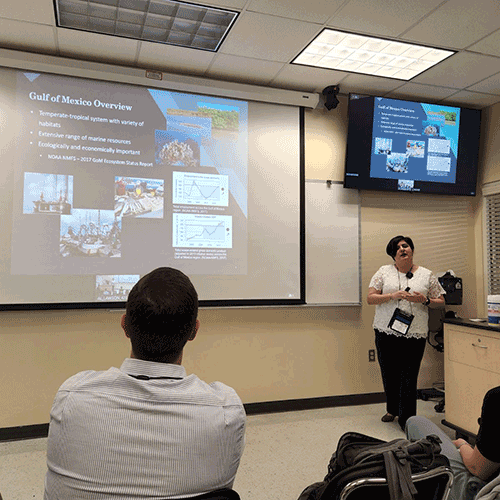
FACULTY ADVISOR:
Owen Temby
CCME II THEMATIC AREA:
N/A
NOAA MENTOR:
N/A
TITLE:
Scientific knowledge management in the Gulf of Mexico.
KEY POINTS:
To effectively manage the Gulf of Mexico ecoregions requires collaboration among stakeholders to coproduce, disseminate, and utilize scientific research and knowledge. Bibliometric analysis of published coauthored scientific papers, examining the frequency and intensity of Gulf of Mexico-related scientific collaboration over 18 years, focusing on organizational, institutional, and geographic characteristics. An examination of the existing knowledge management institutions and collaborative processes will yield knowledge about how and how it occurs.
CCME II Alumni/Research
Edward "Ted" Gniffke
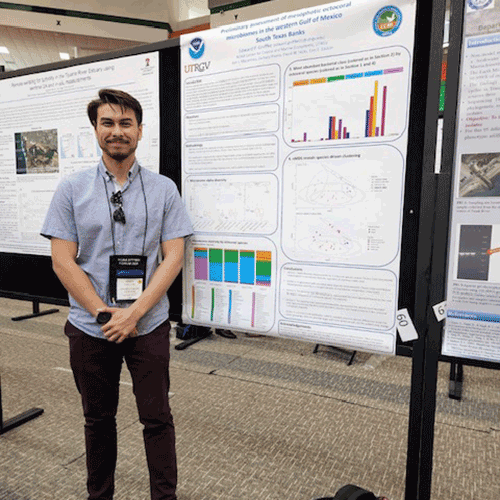
FACULTY ADVISOR:
Dr. Erin Easton
CCME II THEMATIC AREA:
Place-based Conservation
NOAA MENTOR:
Dr. Ian Enoch and Dr. Michael Studivan, NOAA OAR
TITLE:
A preliminary characterization and assessment of mesophotic octocoral microbiomes in the western Gulf of Mexico.
KEY POINTS:
Reveal the bacterial and archaeal taxa composing the microbiomes of 13 different octocoral genera. Gain insight into the potential function of the microbiome for coral host health, immunity, and function.
Jacob Gonzalez
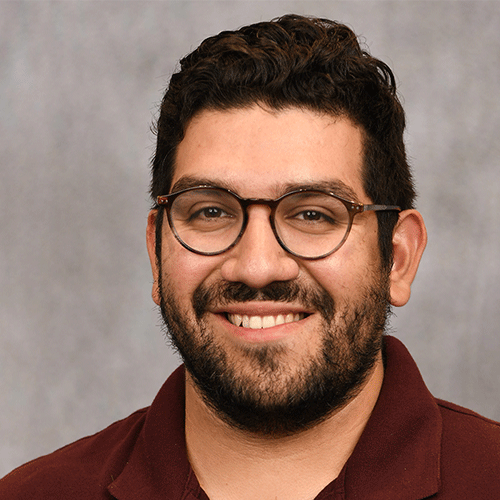
FACULTY ADVISOR:
Dr. Carlos Cintra
CCME II THEMATIC AREA:
Place-based Conservation
NOAA MENTOR:
Dr. Eric Hoffmayer, NOAA NMFS
TITLE:
Increasing temperature effects on the distribution of Anchoa spp. in Texas coasts
KEY POINTS:
Understanding Increasing temperature effects on the distribution of Anchoa spp. in Texas coasts.